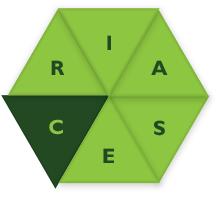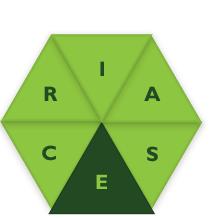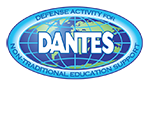June
2017
"Bright Outlook" Business Administration Career Pathways
Learn How DANTES Programs Support Careers in Business

DANTES offers a variety of education and career-development programs to support you throughout your military career. DANTES-sponsored programs can help you navigate through different career pathways as part of your professional military career. They can also help in preparation for your future civilian transition. The goal of the DANTES programs is to equip military students with educational information and support to help:
- Explore career pathways
- Identify required knowledge and skills
- Inform and support the decision-making process
- Pursue the best educational opportunities available to enable long-term professional success
Business Management and Administration
This article focuses on "Bright Outlook" occupations in the Business Management and Administration career field. Bright Outlook occupations will likely grow rapidly in the next several years,
according to the Department of Labor. They will have large numbers of job openings and/or may be new and emerging occupations.
 Every ten years, the Bureau of Labor Statistics (BLS) releases employment projection data to provide information useful when choosing a career or determining the education and training needed for job success. These projections feed the Occupational Outlook Handbook, published by BLS. The handbook is a guide to career information that students can use to learn about hundreds of occupations and the education and training required. The DANTES-sponsored College and Career Planning Counseling Services System,
powered by Kuder Journey®, is fed by these same occupation projections, making it easier for you to access
career information.
Every ten years, the Bureau of Labor Statistics (BLS) releases employment projection data to provide information useful when choosing a career or determining the education and training needed for job success. These projections feed the Occupational Outlook Handbook, published by BLS. The handbook is a guide to career information that students can use to learn about hundreds of occupations and the education and training required. The DANTES-sponsored College and Career Planning Counseling Services System,
powered by Kuder Journey®, is fed by these same occupation projections, making it easier for you to access
career information.
College & Career Planning Counseling Services
The College & Career Planning Counseling Services system, powered by Kuder® Journey, offers interest inventories, as well as a host of other features that serve as a one-stop-shop for military personnel, as you plan, prepare, and transition to civilian employment. You can find Bright Outlook occupations tailored to your personalized interests, work values, and skills to support career pathway exploration through the program. For a detailed description of the Kuder Journey program benefits, features, and support resources, click here.
Career Clusters and Holland Codes
Kuder Journeys’ interest inventory assessment results are based on Holland codes. Holland codes can help match interests to careers by enabling you to explore career clusters by your interests. Holland codes list personality types created by psychologist John Holland as part of his theory of career choice. Each Holland code is a three-letter code comprised of an individual’s dominant personality types. Holland identified six codes collectively referred to as "RIASEC" or the initials standing for the first letter of each of the following personality types:
- R – Realistic
- I – Investigative
- A – Artistic
- S – Social
- E – Enterprising
- C – Conventional
Assessment results that include combinations of C (Conventional) and E (Enterprising) may signal that students may be well suited for business management and administration related careers.

Conventional
- Focuses on work that supports the organization of information and the smooth operational functioning of -enterprises and events
- Work requires organizational, clerical, and arithmetical skills
- Includes occupations involving record keeping, computation, keyboarding or computer operation, such as data entry clerk, secretary, administrative assistant, bookkeeper, accountant, and events manager

Enterprising
- Focuses on work that involves leading, managing, or influencing other people
- Work requires leadership ability, persuasiveness, and other important "people" skills
- Includes occupations involving sale of products or management of people such as salesperson, real estate agent, steward/stewardess, travel guide, sales manager, fund-raiser, and managers of all kinds
Searching Occupations
The Kuder Journey program offers several options for occupation exploration. Once you take the assessments, you can research the following:
- Occupations Suggested by Assessment Results: Students can view a list of occupations suggested by the assessments results
- Occupational Exploration by 6 Holland Clusters: Users can browse occupations and programs by any of the six clusters in the Holland hexagon
- Occupations Related to a Military Occupational Specialty: You are able to select your military specialty from a list. The program displays a list of civilian occupations for which military training may have provided preparation.
- Occupations that Use Skills from Previous Jobs: Important skills related to your most recent jobs are displayed. You are prompted to rate yourself on each skill. The program will return a list of jobs that require the skills that rate the highest.
Occupation Code Icons
All search options will yield occupations that are coded with the following icons:
- Bright Outlook occupations are expected to grow rapidly in the next several years. They will have large numbers of job openings or are new and emerging occupations.
- The Green Economy will cause a change in the occupation’s employment demand or work and worker requirements such as tasks, skills, knowledge, and credentials.
- Realistic: A realistic person prefers concrete tasks. He or she likes working alone or with other people. Some of the careers included in this category are an engineer, plumber, audio/video equipment technician, chemist, and dentist.
- Investigative: Someone who is investigative likes to use his or her abstract or analytical skills to figure things out. He or she is a "thinker" who strives to complete tasks and often prefers to do so independently. These are a few investigative occupations: sociologist, scientist, psychologist, and economist.
- Artistic: The artistic members of our society like to create things and they are imaginative. Artistic occupations include creative writer, performing artist (including actor, singer, and dancer), photographer, and fashion designer.
- Social: A social person prefers interacting with people. He or she tends to be concerned with social problems and wants to help others. Here are some social occupations: home health aide, certified nurse’s aide, RN, licensed practical nurse, social worker, occupational therapist assistant or aide, teacher, and a clergy member.
- Enterprising: Those who are enterprising lean toward leadership roles. They are willing to take on challenges and are extroverted. Enterprising occupations include restaurant host or hostess, retail salesperson, attorney, chief executive, chef, and wholesale or retail buyer.
- Conventional: Someone who is conventional prefers structured tasks and tending to details. He or she is often conservative. These are some conventional occupations: accountant, bookkeeper, actuary, cost estimator, human resources assistant, and loan officer.
Careers in Business Management & Administration
The Business Management & Administration career cluster prepares students for various career responsibilities such as:
- formulating and implementing policy
- managing daily operations
- developing ideas for new ventures
- developing resources to be profitable and sustainable
- planning the use of materials
- human resources
- employee relations
 Careers in this area may lead to the following occupations:
Careers in this area may lead to the following occupations:
- Office Manager
- Business Owner
- Entrepreneur
- Employment Coordinator
- Recruiter
- Operations Manager
- Plant Superintendent
- Administrative Services Manager
- Management Analyst
- Training and Development Specialist
Careers in this field typically require a bachelor’s degree. Several occupations within the Business Management & Administration field are considered Bright Outlook careers by the Department of Labor. In addition to detailed career information available through Kuder Journey, you can use the Labor Department's My Next Move for Veterans to research knowledge, skills, abilities, personality traits, required technology, education, and job outlook information for individual careers.
If you have more questions, remember... you can always find more information on DANTES VolEd programs at our website and on our Service member blog!

